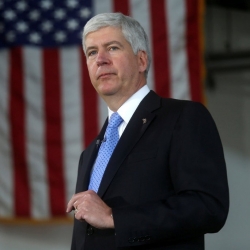
Gov. Snyder also vetoed the controversial bill — called by opponents a Republican “power grab” — which would have limited his successor’s powers.
Departing Michigan Gov. Rick Snyder vetoed bipartisan House Bill 4926, which would have legalized online gambling in his state. The Michigan House and Senate each passed HB 4926 last week.
Gov. Snyder’s veto surprised most gambling analysts, who assumed that Snyder would approve a bill passed by a state legislature controlled by his fellow Republicans.
Instead, Rick Snyder vetoed a total of 40 bills a few days before leaving office. Other bills he vetoed were HB 4927 and HB 4928, which were companion pieces to the main online gambling legalization bill.
In his veto letter, Gov. Snyder said he appreciated lawmakers’ attempts to pass the draft legislation, but he was against how the bill would affect the state budget.
Rick Snyder on Online Gambling Veto
Gov. Snyder’s letter defending his veto stated, “Due to largely unknown budgetary concerns, I believe this legislation merits more careful study and comparison with how other states have, or will, authorize online gaming.”
“To be blunt, we simply don’t have the data to support this change at this time.”
Rick Snyder Cites School Aid Fund
Rick Snyder suggested that the lower tax rate for online gambling could have shifted revenues from the state lottery to online poker and casinos. Because the lottery contributes to the School Aid Fund, the governor said he was concerned the bill could hurt the school aid fund.
The governor makes good points, but the lawmakers who voted to pass HB 4926 have solid evidence that the bill would generate more cash for the state treasury without harming lottery ticket sales. Experts claim that lottery bettors and online casino gamblers often are different people with different expectations and habits.
New Jersey’s state lottery, which is comparable because of similar population sizes and the presence of online gambling, had a decline in 2017. In the previous 3 years when online gambling was active, New Jersey had growth in state lottery revenues.
Lottery sales were at $3.1 billion for the year with a contribution of $994 million to the state treasury. While 2018 New Jersey State Lottery receipts are incomplete, the state reported a 3% growth year-to-year for October 2018. It appears lottery receipts will grow at the same time that online gambling revenues have grown, so Rick Snyder’s concerns might be unwarranted.
New Jersey Online Gambling
In 2017, New Jersey’s online gambling industry generated $245 million. If New Jersey’s December figures match its November revenues (and it should), then the online gambling industry is on a pace to generate $288 million in revenues.
The year-on-year growth has been on a similar pace for the past 5 years, so New Jersey’s online gambling industry could top $300 million in 2019. New Jersey has a population of 9.006 million.
Michigan Sports Betting Prospects
Michigan has a population of 9.962 million. Even if one accounts for the fact many North Jersey residents commute to New York City and have higher incomes than the average Michigan resident, the fact Michigan has almost 1 million more residents suggests it also could top $250 million to $300 million in online gambling revenues each year.
In only 6 months of operation, New Jersey’s sports betting industry has had over $1 billion in turnover. HB 4926 companion bills were expected to introduce sports betting legalization, which would have allowed the state’s 19 tribal casinos and 3 commercial casinos to offer sports betting. Once again, the tax revenues on a $2 billion a year sports betting industry would be significant for Michigan’s state budget.
Coalition to Stop Internet Gambling (CSiG)
Gov. Rick Snyder’s decision to veto HB 4926 is a big win for Sheldon Adelson, the CEO of Las Vegas Sands and Republican mega-donor who funds the Coalition to Stop Internet Gambling (CSiG). Sheldon Adelson has been the top GOP donor the past two presidential cycles, while he contributed $123 million to Republican candidates and causes in the 2018 midterm elections.
Adelson is a top ally of President Donald Trump, who named Sheldon and his wife, Miriam Adelson, to his 2017 Inauguration Committee. President Trump also recently gave Miriam Adelson the Presidential Medal of Freedom for her decades-long philanthropic work.
2019 Michigan Online Gambling Bill
It is unknown whether Rick Snyder’s veto is a temporary or permanent setback for online gambling in Michigan. In 2019, Democrat Gretchen Whitmer takes control of the Michigan governors mansion. Democrats came short of the 9 seats in the House and 9 seats in the Senate to flip the state legislature, but they did flip 5 seats in each legislative body in the 2018 midterms.
That gives the GOP a 22-16 advantage in the Michigan Senate and a 58-52 advantage in the Michigan House of Representatives. With a smaller margin for the GOP majority and a Democrat as governor, Sheldon Adelson’s influence and ability to block online gambling legislation should decline in 2019. Lawmakers might not appreciate having their carefully crafted bill vetoed, so they might pass a new version of HB 4926 when Rep. Brandt Iden inevitably introduces it to the legislature in early 2019.
